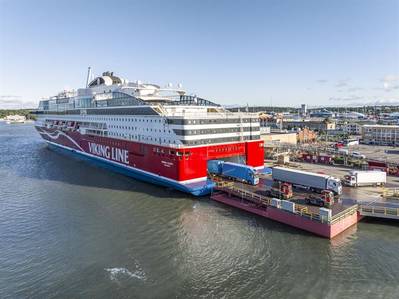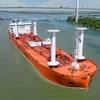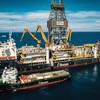Baltic Sea’s First Green Freight Corridor Opens
The Baltic Sea's irst green freight corridor has been launched, allowing for the transportation of Felix ketchup to Finland with a 90% reduction in emissions. This initiative, a collaboration between Orkla Suomi, Scandic Trans, and Viking Line, features a scheduled freight service powered by biofuel.
Since July, Felix ketchup, produced by the Orkla Group in Fågelmara, has been shipped to Finland using biofuels. The process begins at the largest ketchup factory in the Nordic region, where Scandic Trans trucks transport the product to Viking Line’s terminal in Stadsgården, Stockholm. From there, the trucks cross the Archipelago Sea aboard the climate-friendly vessels Viking Glory and Viking Grace, delivering the ketchup to Orkla’s logistics center in Turku.
Utilizing biofuels results in a 90% decrease in carbon dioxide emissions along the 683-kilometer transport route compared to traditional fossil fuels. Scandic Trans fuels its trucks with hydrotreated vegetable oil (HVO), while Viking Line sources liquefied biogas (LBG) from organic waste through Gasum to meet its fuel needs during transit.
“At Orkla’s companies, large volumes of food products are transported between the Nordic countries. The biogas project on this bustling route is one step in our sustainability journey. Our goal is to cut our greenhouse gas emissions in half by 2030 compared to 2016. Reducing our environmental impact is part of our day-to-day development work. So it was fantastic how easy it was for us as a cargo customer to make the switch to this green maritime corridor,” said Mauri Suuronen, Planning and Logistics Manager at Orkla Suomi.
For each shipment, carbon dioxide emissions are reduced from 1,512 kilograms to 102 kilograms, leading to an annual decrease in emissions of about 190 tonnes.
“Lowering emissions has long been a key issue for road transport, so we have focused on introducing HVO biofuel. Now that it is also possible to use biofuel in the maritime part of the transport chain, the emissions reduction is revolutionary. And the most important thing is that biofuel can be used on a large scale, and the environmental impact can be reported for each transport mode. The transport sector’s reputation is not the best on environmental issues, so it is important to show that sustainable alternatives are available,” said Mikael Löfqvist, CEO of the transport company Scandic Trans.
Viking Glory and Viking Grace currently operate mostly on liquefied natural gas (LNG), but they have been built to run on the bio and synthetic fuels of the future.
“We have invested a total of 450 million euros in our climate-smart vessels. As a result, we have now successfully launched scheduled freight service using biofuel in partnership with Orkla Suomi and Scandic Trans. This is a fantastic and important demonstration of the power of cooperation on sustainability measures – this requires supply and demand, and naturally a shared willingness to take climate-smart actions. This green freight corridor has attracted enormous interest across the Nordic region, and it is only a matter of time before more companies sign up,” said Harri Tamminen, Freight Director at Viking Line.
















